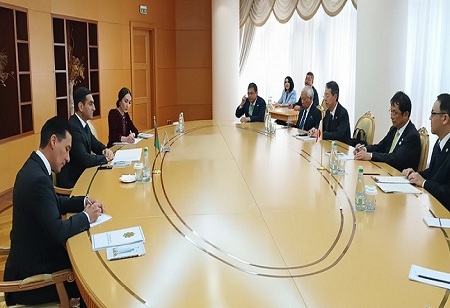President Serdar Berdimuhamedov, and Kyosuke Nagata, President of Tsukuba University, one of Japan's major national institutions. The meeting's major theme was a discussion of the opportunities for developing historic Turkmen-Japanese connections in research and education. According to the parties, a significant amount of cooperative work has already been completed in the sphere of scientific collaboration, and there are several potential for expanding the relationship. The growth of Turkmenistan's national education system is a priority of the country's state policy, according to the country's president. Recently, in honor of the Day of Knowledge and Student Youth, ceremonies were organized around the country to commemorate the commissioning and laying of the foundation of new educational institutions. "We value the utilization of international expertise and successes in developing the education system," Turkmen President Gurbanguly Berdymukhamedov stated, underlining the effectiveness of Turkmen and Japanese collaboration in this field.
The training of Turkmen youth in Japan, the teaching of the Japanese language in several Turkmen secondary and higher educational institutions, and the established relations between representatives of science and education all confirm Turkmenistan and Japan's close cooperation in the field of education.The Japanese University of Tsukuba and Turkmen universities - the Turkmen National Institute of Foreign Languages named after Dovletmammet Azadi and Turkmen Oguz Khan University of Engineering and Technology - collaborated effectively, according to the president of state. He expressed confidence that this collaboration, which is critical to the development of a contemporary, educated young generation, will continue to thrive.
In reply, the President of the University of Tsukuba emphasized that the long-term productive partnership was formed by Turkmen National Leader Gurbanguly Berdimuhamedov, Chairman of the Halk Maslahaty of Turkmenistan and Honorary Doctor of the University of Tsukuba. As previously stated, the agreements reached at the highest level create favorable conditions for establishing the closest partnership in the field of personnel training, including through teaching by Japanese specialists in Turkmen universities, organizing internships, and exchanging experience in various fields. Turkmen youngsters are educated at prominent Japanese universities, and Japanese is studied at various Turkmen secondary and higher educational institutions. Representatives of scientific and educational institutes keep active connections. Reciprocal trips are planned in order to share experiences and attend scientific conferences.
The University of Tsukuba and the Turkmen National Institute of Foreign Languages named after Dovletmammet Azadi have formed a collaboration. Cooperation with the Oguz Khan University of Engineering and Technology has a lot of promise. The parties indicated a desire in sharing experiences and training instructors of the Japanese and Turkmen languages in Turkmenistan and Japan, respectively. Cultural and humanitarian collaboration, as Hajiyev remarked, is an essential component of Turkmen-Japanese relationship. The effective collaboration in the fields of research, education, and Japanese language study was highlighted in this setting. The parties remarked on the active growth of collaboration between the University of Tsukuba and the Turkmen National Institute of Foreign Languages named after D.Azadi, as well as the University of Engineering and Technology named after Oguz Han. The opportunities for future growth of contact, notably through exchange educational programs between Turkmen and Japanese higher education institutions, were stressed.

